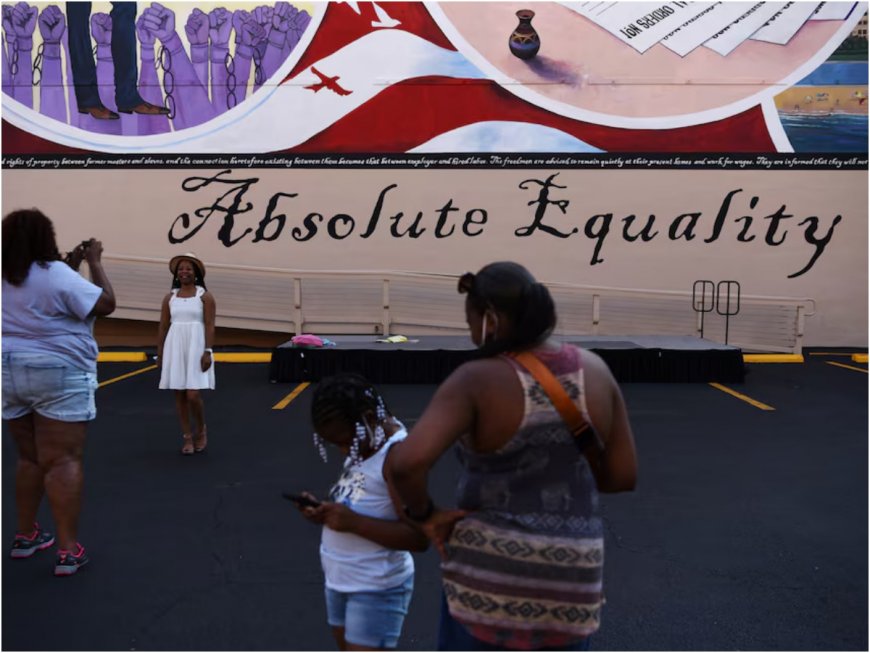What is Juneteenth? All You Need To Know About This Federal Holiday and Its Historical Significance
The significance of Juneteenth might not be known to many Americans, since they might not have learned about the event in school.

Juneteenth: Americans will gather on June 19 to celebrate Juneteenth, the latest federal holiday in the United States. Although this day has been celebrated by Black Americans since the mid-to-late 1800s, Juneteenth was long omitted from history books and was not designated as a federal holiday until 2021.
The change came after the police killings of George Floyd, Breonna Taylor, and other Black people in the US renewed the push for conversations on racial justice and the holiday’s recognition at the national level.
“It recognizes liberation, it recognizes freedom. Some people will refer to it as Black Independence Day. It’s a day to celebrate the ending of an era of 246 years of enslavement that African Americans experienced in this country,” Daina Ramey Berry, Professor of History and Dean of Humanities and Fine Arts at the University of California, Santa Barbara said to TIME.
The significance of Juneteenth might not be known to many Americans, since they might not have learned about the event in school. “Many people assume that freedom began with the Emancipation Proclamation and think of Lincoln as the great liberator,” Berry said to TIME.
HISTORY OF Juneteenth DAY
On January 1, 1863, President Lincoln signed the Emancipation Proclamation, declaring that “all persons held as slaves” in the Confederacy or states that seceded from the Union, “are, and henceforward shall be free.” But that freedom did not come immediately, as the Civil War continued on and Union soldiers went from state to state to enforce the measure. “Essentially, very few enslaved people were freed in 1863,” says Berry.
On June 19, 1865, two and a half years after the Emancipation Proclamation was issued and two months after the Civil War officially ended, Union Army General Gordon Granger, accompanied by 2,000 soldiers, arrived in Galveston, Texas, to inform enslaved people of their freedom.
“When the Union army reached Galveston and notified Black people of their freedom, it generally signified that the last segment of the roughly four million slaves in the South, now knew they were officially free,” Nafeesa Muhammad, Associate Professor of History at Spelman College, told TIME in an email. “And this is the significance of Juneteenth.”
What is Juneteenth?
Juneteenth marks the day in 1865 enslaved people in Galveston, Texas, found out they had been freed — after the end of the Civil War, and two years after President Abraham Lincoln’s Emancipation Proclamation.
Just after the Civil War ended, outdoor spaces facilitated large, lively reunions among formerly enslaved families, many of whom had been separated. These gatherings were particularly revolutionary as they were free from the restrictive measures known as “Black Codes.” Enforced in Confederate states, these codes controlled various aspects of daily life for liberated slaves, including their ability to vote, buy property, gather for worship, and more.
Others may choose to treat Juneteenth as a day of rest and remembrance. That can mean doing community service, attending an education panel or taking time off.
The important thing is to make people feel they have options on how to observe the occasion, said Dr. David Anderson, a Black pastor and CEO of Gracism Global, a consulting firm helping leaders navigate conversations bridging divides across race and culture.
“Just like the Martin Luther King holiday, we say it’s a day of service and a lot of people will do things. There are a lot of other people who are just ‘I appreciate Dr. King, I’ll watch what’s on the television, and I’m gonna rest,’” Anderson said. “I don’t want to make people feel guilty about that. What I want to do is give everyday people a choice.”
What's Your Reaction?



























































